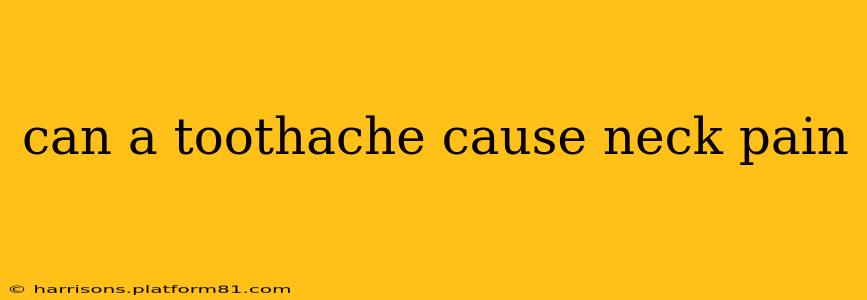A toothache is rarely pleasant, causing throbbing pain, sensitivity to temperature, and often, difficulty eating. But did you know that this oral discomfort can sometimes radiate to other areas of the body, including the neck? Yes, a toothache can cause neck pain, and understanding why is crucial for effective treatment.
How Can a Toothache Lead to Neck Pain?
The connection between toothaches and neck pain isn't as straightforward as a direct nerve connection. Instead, it's a complex interplay of factors:
-
Referred Pain: This is the most common explanation. Nerve pathways in the head and neck are intricately connected. When pain signals originate from the teeth or jaw, they can be misinterpreted by the brain as originating from the neck. This "referred pain" feels like it's coming from the neck, even though the source is actually dental. The trigeminal nerve, which innervates the face, teeth, and jaw, plays a significant role in this phenomenon.
-
Muscle Tension: A severe toothache often leads to clenching or grinding of the teeth (bruxism). This can strain the jaw muscles, leading to tension headaches and ultimately, neck pain. The muscles in the neck and jaw are interconnected, so tension in one area readily spreads to the other.
-
Inflammation: Severe dental infections can cause significant inflammation, which can affect the surrounding tissues. This inflammation can spread to the neck muscles and trigger pain.
-
Posture: A toothache can cause you to adopt poor posture, subconsciously trying to alleviate the discomfort. This can strain the neck muscles and contribute to pain.
What Are the Symptoms of Neck Pain Related to a Toothache?
Neck pain associated with a toothache often manifests as:
- Aching or stiffness in the neck: This pain might be localized to one side of the neck, mirroring the side of the affected tooth.
- Limited range of motion: You might find it difficult to turn your head or bend your neck comfortably.
- Pain that worsens with jaw movement: Chewing, yawning, or talking can exacerbate the neck pain.
- Headaches: Often, the neck pain is accompanied by headaches, particularly tension headaches.
How Can I Tell if My Neck Pain is from a Toothache?
Differentiating between neck pain originating from dental issues and other causes can be challenging. However, some clues can help:
- Timing: Did the neck pain start around the same time as the toothache, or was it already present?
- Location: Is the neck pain localized to one side, coinciding with the affected tooth?
- Jaw pain: Is there accompanying pain or tenderness in the jaw?
- Dental history: Have you experienced recent dental problems, such as cavities, gum disease, or trauma to a tooth?
It's crucial to consult a dentist or doctor if you experience neck pain alongside a toothache. They can properly diagnose the cause and recommend appropriate treatment.
What if I have neck pain and suspect a toothache? Should I see a dentist first?
Seeing a dentist first is generally recommended if you suspect your neck pain might be related to a dental problem. A dentist can examine your teeth and gums, identify any underlying dental issues like cavities, gum disease, or abscesses, and determine if these are contributing to your neck pain. They can provide appropriate treatment, which may alleviate your neck pain as a result. If the dentist rules out dental problems, they may refer you to another specialist, like a doctor or physiotherapist, to investigate other potential causes of your neck pain.
Can antibiotics help neck pain caused by a toothache?
Antibiotics may be helpful if the neck pain is stemming from an infected tooth or gum. A dental infection can cause inflammation that spreads to surrounding tissues, including the neck muscles. Antibiotics combat the infection, reducing inflammation and thus alleviating pain. However, antibiotics are only prescribed by a dentist or doctor if a bacterial infection is confirmed.
How is neck pain from a toothache treated?
Treatment focuses on addressing the underlying dental problem. This may include:
- Root canal: To treat a severely infected tooth.
- Extraction: Removal of the affected tooth if it's beyond repair.
- Antibiotics: To combat infection.
- Pain relievers: To manage pain and inflammation (over-the-counter or prescribed).
- Muscle relaxants: To relieve muscle tension if bruxism is a contributing factor.
- Physical therapy: To address muscle tension and improve neck mobility.
Remember, self-treating can be dangerous. Always seek professional advice from a dentist or doctor if you experience persistent toothache or related neck pain. Early intervention is key to preventing more serious complications.
